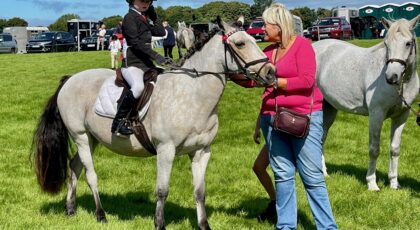Mustang training is a kind of calling, no matter how you arrive at its door.
For 24-year-old trainer Tori Bromme, that call came in a very 21st century way. In 2012, the then-11-year old watched the Amazon Prime documentary, Wild Horse, Wild Ride, a film that chronicles trainers competing for the Extreme Mustang Makeover Challenge.
“I was like, ‘Oh, my goodness, I definitely want to do that competition someday!” says Bromme, a Lincoln, Nebraska native who grew up competing in eventing and riding off-the-track Thoroughbreds.
“I didn’t have the facility for it at the time, and didn’t know how to get started, or what the resources were—I was still in high school—so it just didn’t really seem feasible at that moment.”
Things changed after Bromme graduated from Union College, married her supportive but non-horsey husband, and moved to a farm in North Dayton, Ohio to start her own training business.
“I just thought, ‘Now is as good a time as ever to just go for it,’” says Bromme, who began researching how to become a TIP trainer on the Mustang Heritage Foundation’s website. “I thought getting my certification could be a great opportunity to just get my hands on some Mustangs, and get a feel of how they go before entering a huge competition like the Extreme Mustang Makeover.”
As it happened, Bromme hit the lottery her first time out with Aero, a Mustang she picked up for her first Extreme Mustang Makeover in Fort Worth, Texas. In just 100 days, Aero not only exceled under saddle, but earned a lasting place in Bromme’s affections.
“He was the coolest little Mustang—he was my heart horse,” she says of the special gelding, who developed a habit of nickering whenever he heard Bromme’s footsteps walking down the barn aisle.
“In the beginning, I didn’t really think I would be a Mustang person, per se. I just thought the idea of training Mustangs was cool. I had worked with a lot of feral and abused horses,” Bromme explains. “But the more I worked with them, the more I realized there’s something so special about the Mustang as a breed.
“Most of them just have such level heads, and good dispositions,” she says, adding that she’s seen the ever-versatile breed doing everything from eventing and reining to beating the Quarter Horses at cow-working. “There are so many Mustangs that I’d feel comfortable putting my beginner riders on [in lessons].
“I just want to encourage more people to consider adopting and putting the training and the money into them, because they’re such sturdy animals, too.”

Yet while Aero taught Bromme how easy it was to love a Mustang, he also taught her one of the hardest lessons of the TIP trainer: Sometimes, no matter how much you love them, you have to let them go.
“I actually bid on him in the auction [after the Makeover], but I lost his bid. I was pretty devastated,” says Bromme of Aero, who went on to a good home elsewhere in Texas.
Back then, however, Bromme didn’t have much time to dwell on her loss.
As it was, she was five months pregnant with her first daughter, Amelia, who was born in January. Bromme picked up her next Extreme Makeover draw, Athena—a 5-year-old mare from Coyote Lake, Oregon—when she was just six weeks post-partum.
“It was a little crazy,” Bromme laughs. “But I think all of us Mustang people have it in our blood. We’re all kind of a little bit wild.”
Athena, too, put in a solid performance at the Extreme Mustang Makeover in Tennessee this spring, subsequently finding her own forever home as a family horse in Ohio.


Just a few days after the mare sold, Bromme welcomed Caspian, a level-headed 4-year-old Mustang from the Nevada Wild Horse Range. And she’s currently mentoring one of her own students through the gentling process using two mares from Salt Wells, Wyoming. That rider is in the process of adopting another of Bromme’s TIP-trained Mustangs.
“My big goal is to do more training programs for people who want learn how to interact and work with wild horses. I’d love to do a Youth Training Challenge, and start running some of my own [TIP] challenges down the road,” Bromme explains.
Next year, she’s also hoping to mentor a group of students through their own TIP challenge. That pay it forward mentality is something Bromme says isn’t unique to her lesson program, but to the Mustang community, in general.
“That’s one thing that really drew me to Mustangs, because I had done some competitions where people get very much, like, ‘Oh, well, I spent $50,000 on my horse, and I only practice twice a month because my trainer does it all…’
“I saw so much positivity among the trainers at the [Extreme Mustang Makeover],” she continues, adding that it’s not unusual for fellow Mustang contestants to offer advice, share their props, or support one another ringside while competing. “I think everyone knows that we all put the time in, and we all care about these horses. It seems like everyone is there for the horse and not just to win.
“Some are easier than others, but all these Mustangs are so different; they have different personalities. Just gaining their trust in a short amount of time—100 days—and then bringing them to a show environment and demonstrating that they trust you on the ground is a huge accomplishment.”
Bromme recommends that prospective Mustang adopters lean heavily on Mustang Heritage Foundation resources, such as the TIP Trainer Marketplace page, which can help you find TIP-trained Mustangs or burros for adoption in your area.
“The Mustang community really cares about bringing more people in, so don’t hesitate to ask questions,” notes Bromme, who says there’s good advice to be found on Facebook Groups such as BLM Mustang Hub and the BLM Mustang Family. “Every time I see someone asking for help as a first-time Mustang owner, there are usually and hundreds of helpful comments on that post.”
Bromme also recommends that if and when you are ready to find a Mustang, working directly with your TIP trainer throughout the training process can help to improve the odds of success.
“It does matter,” she says. “The more you can be out watching your trainer work, asking to be involved, and getting your hands dirty, so much the better. I see so much more success with the people that are there, trying to bond with their horses from day one.”
Bromme is currently in the process of moving locations to another farm in Western Ohio, where she hopes to continue building her Mustang training operation. And, true to her word, she’s recently adopted a “forever” wild horse of her own: A good-brained, well-built black Mustang from Diamond, Nevada named Ace, who she hopes to train as a kind of ambassador for the breed in both eventing and ranch work.
As fate would have it, Ace is from the same herd as Bromme’s heart-Mustang, Aero, and the two geldings were rounded up at the same time. They even had their Coggins tests drawn next to one another while in holding.
“Who knows, they could be half-brothers or something? They’re the same age,” Bromme says. “I feel like, in some way, I have a piece of Aero with me now, and that makes my heart happy, because I do miss him every day.
“Mustangs are so good-minded, and they’re such willing partners once they understand what you want. They seem to have this soulfulness about them,” Bromme reflects. “I think they’re just appreciative; they know what it’s like to be hungry, and they know what it’s like to be thirsty. And so, they’re just like, ‘You’re taking care of my needs, what can I do for you?’
“They become very bonded with their trainers, and they’re so much more willing to jump through fire for [you]. It’s kind of this cool relationship,” Bromme says.
“The majority of them really have good hearts, and that’s really drawn me in.”
To find a Mustang near you in training with an approved TIP trainer, visit the TIP Trainer Marketplace and the TIP Facebook group.




 September 5, 2023
September 5, 2023 




























